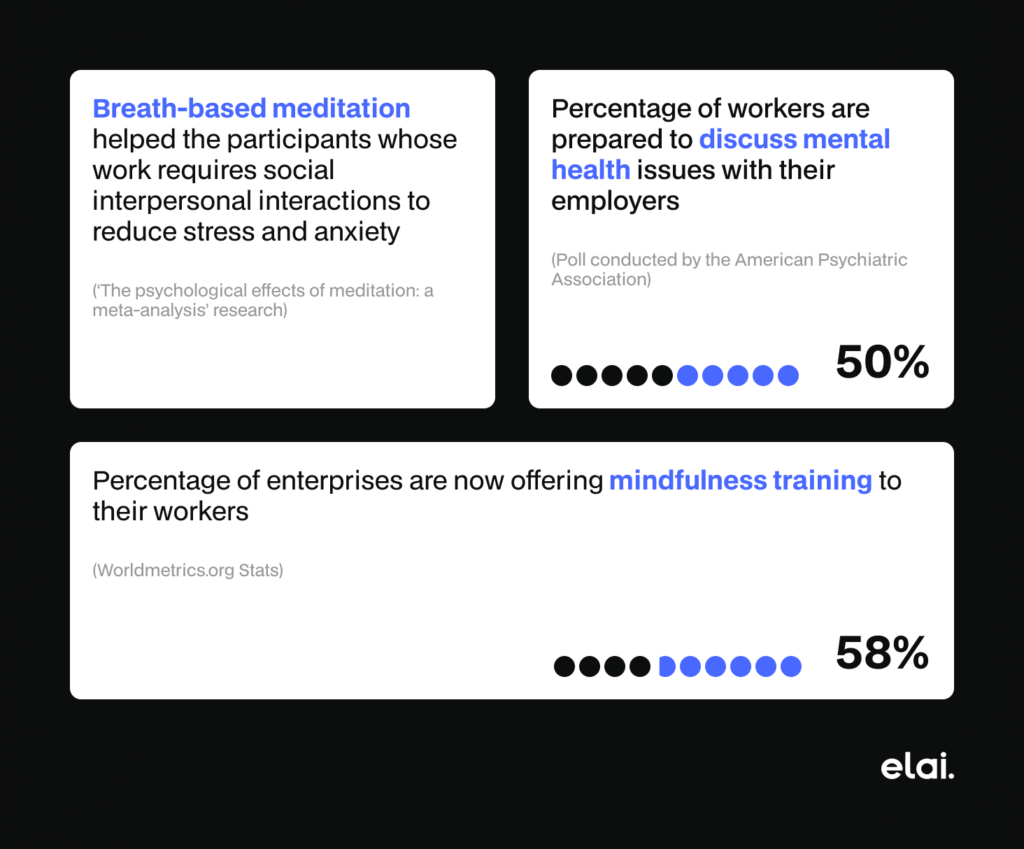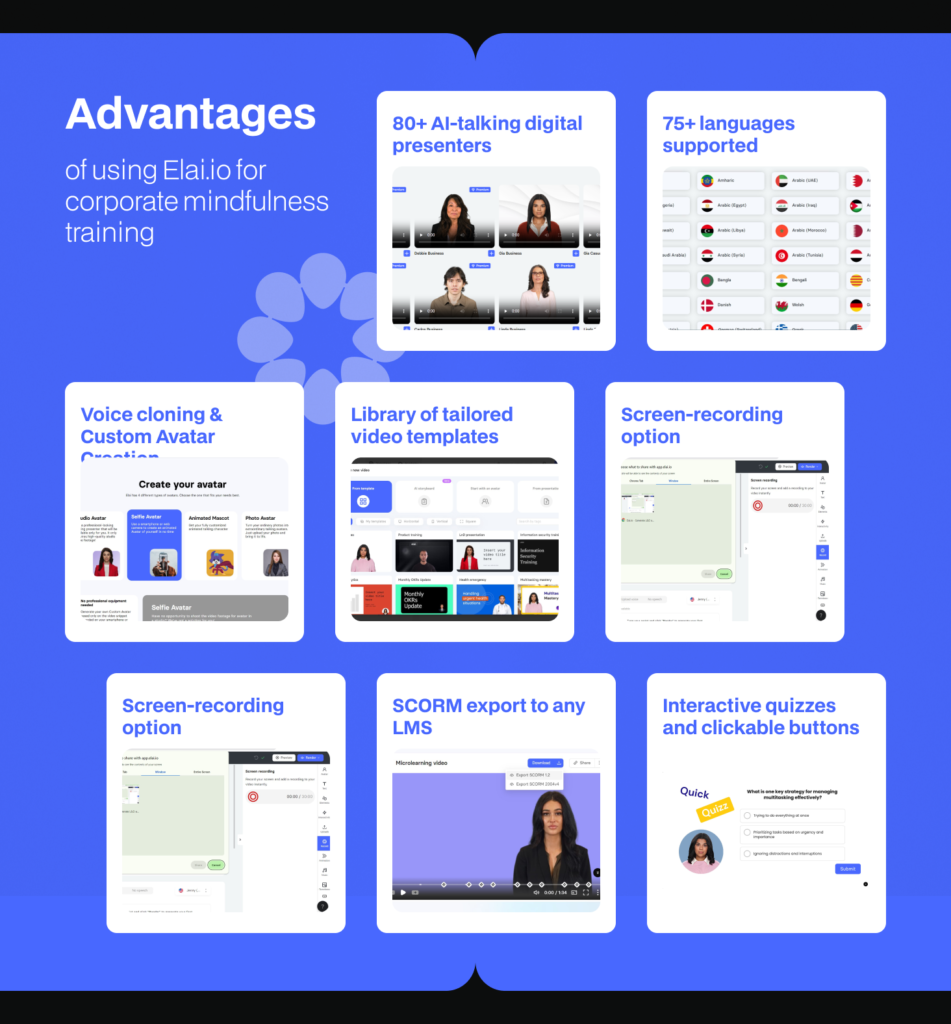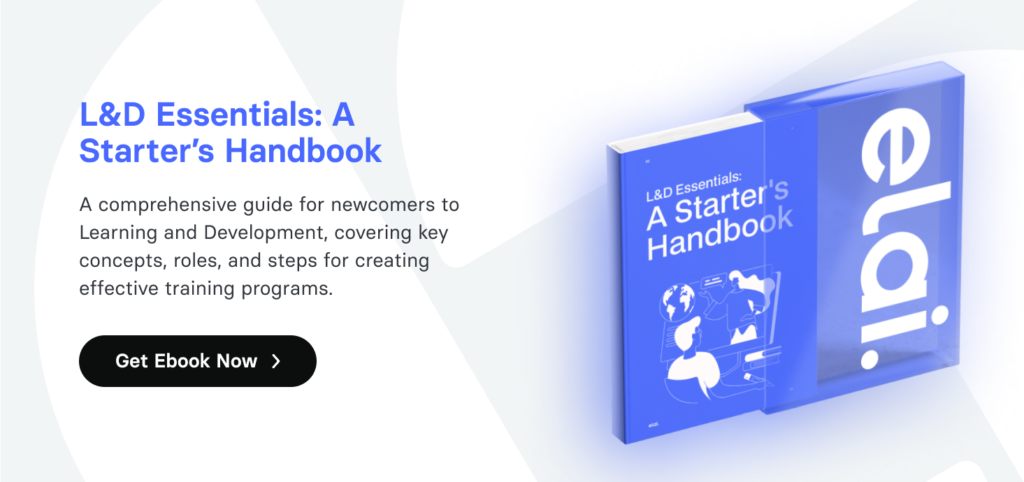In the modern business world, mental health plays a significant role in building a thriving, inclusive, and supportive working environment. Employee well-being and overall team productivity rely directly on raising awareness about the importance of mental health and incorporating mindfulness practices into the ongoing internal training process. Recently, corporate mindfulness has received significant attention.
Mindfulness is a sense or state of being completely aware of your surroundings, including one’s thoughts, feelings, and environment without judgment. This practice encourages individuals to pay attention to the present moment rather than thinking about past events or worrying about the future. Mindfulness practices, such as meditation and deep breathing, can help reduce stress, improve focus, and enhance overall well-being. Also, this is a preventive method of getting burnout in the workplace. In this article, we dive into the world of mindfulness, discover the most applicable practices that really work, and gain insights on how to craft compelling corporate mindfulness courses that will increase team productivity and enhance overall job satisfaction.
The Need for Mindfulness for Employees in the Workplace
Within workplace settings, team leaders and HR professionals should always take care of providing a healthy and understanding working environment where everyone feels respected and supported. As the demands of modern work environments increase, employees are facing rising levels of stress, work-life balance issues, and decreased productivity. The main aim of corporate mindfulness programs is to address these challenges by providing employees with tools to manage this mental state.
According to the “The psychological effects of meditation: a meta-analysis” research, breath-based meditation helped the participants whose work requires social interpersonal interactions (customer service representatives, consultants, doctors, call center agents, teachers, etc.) to reduce stress and anxiety.
Increased corporate demands, longer working hours, and constant connectivity brought a negative workplace culture with conflicts, low morale, and decreased teamwork. According to a poll conducted by the American Psychiatric Association, only 50% of workers are prepared to discuss mental health issues with their employers. However, we have started to observe a positive widespread practice of companies implementing corporate mindfulness workshops in their internal employee training – 58% of enterprises are now offering mindfulness training to their workers (Worldmetrics.org Stats).

Benefits of Corporate Mindfulness Training
Corporate mindfulness programs bring a variety of benefits to HR departments as they are cost-effective and flexible. Such training creation does not even require a trained facilitator as a speaker if the course creator chooses the right tool such as Elai.io. The platform offers a huge collection of video editing tools that can help companies create professional-looking multilingual courses with AI narration in bulk. The content can be rewatched and easily updated. In addition, the facilitator can tailor and personalize the course for specific employees by changing the script of the video in a few clicks.
Advantages of using Elai.io for corporate mindfulness training:
- 80+ AI-talking digital presenters
- 75+ languages supported
- Voice cloning & Custom Avatar Creation
- Library of tailored video templates
- Screen-recording option
- SCORM export to any LMS
- Interactive quizzes and clickable buttons
Corporate mindfulness training helps organizations create a healthier, more productive, and more engaged workplace. Here are some benefits of incorporating such training:
- Improved Employee Well-being: Employees will be able to manage stress and anxiety. Also, these programs reduce the likelihood of burnout and absenteeism leading to higher job satisfaction and overall commitment to the company.
- Enhanced Productivity Performance: Mindfulness makes workers more focused on their work and engaged in the working process by enhancing concentration on tasks.
- Better decision-making: Reduced emotional biases and self-control promote clear thinking. Employees also become more aware of their thoughts, feelings, and sensations. While making a decision, it is crucial to identify and cope with stress triggers.
- Increased creativity: Corporate mindfulness training helps employees think outside the box which leads to new innovative and creative ideas and approaches.
- Improved Company Culture: Leaders can create a more positive and supportive work environment, fostering teamwork and collaboration, reducing employee turnover, and saving the company time and money.
- Cost-Effectiveness and Flexibility: Mindfulness training does not require any specific settings and equipment. The only thing you need is an AI-driven video editor, script, and Avatar for narration. Moreover, at Elai.io you can write a simple text prompt and AI will create a complete course from scratch in a matter of seconds.
- Improved Work-Life Balance: Employees will sense a balance between their work and personal lives, reducing burnout.

3 Mindfulness Practices for Corporate Stress Reduction
Mindfulness Training can be a powerful tool for reducing corporate stress. Here are three techniques you can incorporate into your workday:
1. Mindful Breathing
Technique: Find a quiet space and focus on your breath. Inhale deeply through your nose, and then exhale slowly through your mouth. Pay attention to the sensations in your body as you breathe.
Benefits: Mindful breathing helps to calm the nervous system and reduce feelings of anxiety.
2. Body Scan Meditation
Technique: Lie down or sit comfortably and close your eyes. Begin by focusing on your toes. Notice any sensations, such as warmth, coolness, or tingling. Gradually move your attention up your body, paying attention to each part.
Benefits: This practice helps to ground you in the present moment and reduce physical tension.
3. Mindful Eating
Technique: Before eating, take a few moments to appreciate your food. Notice its color, texture, and aroma. Eat slowly, savoring each bite.
Benefits: Mindful eating can help to reduce stress-related overeating and improve digestion.
Make these practices consistent and you’ll likely notice a decrease in stress and an improvement in your overall well-being. Also, follow the tips below to be present and focused:
- Clean your workspace
- Use natural light
- Add plants
- Turn off distractions by silencing phone notifications
- Take short breaks
- Practice deep breathing
- Set boundaries and learn to say “no” when necessary
- Get enough sleep
- Do some light exercises, stretch, or take a short walk
- Dedicate a few minutes each day to meditation.
- Build strong relationships with colleagues and friends
Conclusion
Corporate mindfulness training is a powerful tool for building a supportive, thriving, productive, and inclusive working environment. With these practices team leaders and HRs can empower employees’ working potential by reducing stress and anxiety and improving overall company culture. By following tips and techniques mentioned in this article, workers can develop a sense of presence, and become more focused and sefl-aware. Long-term commitment to mindfulness practices is the key to personal and organizational growth enhancing internal leadership in the team and promoting creative and innovative thinking.
FAQ
What is Workplace Mindfulness?
Workplace mindfulness is the practice of being present and self-aware in the workplace. It encourages employees to pay attention to their thoughts, surroundings, and feelings without judgment. This can help reduce stress, improve focus, and increase productivity.
Why is mindfulness important in the workplace?
Mindfulness improves focus, reduces stress, and enhances productivity. It fosters a positive work environment and better relationships with colleagues.

